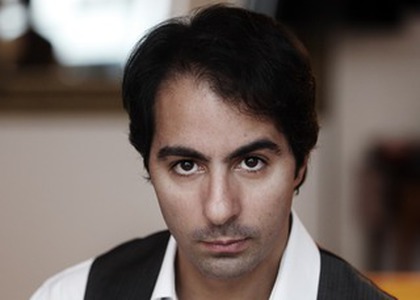> [Archived] Interviews

Interview with pianist Saleem Abboud Ashkar
Today, March 29th, pianist Saleem Ashkar will take to the stage of the Radio Hall, under the baton of Frédéric Chaslin, with the National Radio Orchestra. He will perform Edvard Grieg's Concerto for Piano and Orchestra.
First of all, how have the rehearsals been so far?
It's been wonderful. I enjoy collaborating with this orchestra. This is my second visit here. A few years ago, before the pandemic, I played Brahms' Piano Concerto No. 1 at the Radio Hall, and I'm delighted to be back. I love the orchestra and the way they play and rehearse. It's always a pleasure when all these elements come together for music.
Can you share a few details about the Grieg piano concerto you'll perform?
Grieg's concerto is a unique piece in many ways. It's one of the most well-known piano concertos, highly popular. In a way, one could say, "We've encountered Grieg's work so many times, we know it so well, it's played so often," but on the other hand, I believe we shouldapproach it with fresh eyes and attentive ears, we should see it as a musical composition, a text; and viewed through this lens, it undeniably emerges as a remarkable masterpiece. It encompasses so many influences, ranging from Schumann to Dvoøák, yet at the same time, it never strays into eclecticism or imitation in any way.
As a performer, do you feel a greater sense of freedom when the music is more popular, when the people are already familiar with it-as is the case with Grieg's piano concerto or Beethoven's piano sonatas-do you feel there are things the audience already knows, and which you can relate to?
Actually, no, not at all. I don't shift my perspective on the piece-at least not consciously (sometimes, we can make decisions unconsciously or subconsciously). However, consciously, I always try to approach the work through the text, through understanding and internalizing the text. We do need composers, of course, but in a sense, composers rely on us too, not only to approach the text as faithfully or objectively as possible but also to make it our own because a musical piece can only truly come alive in the present moment, and then it can only live if the performer makes it his or her own, if he or she becomes the piece. I don't think in these terms. I don't think about the expectations of the audience or the other performers, but I also don't think in terms of objectivity or subjectivity regarding the text. I believe that, in the end, there must be one thing in which you wholeheartedly believe in that moment of interpretation. I believe this is a process; it's something you must work on all the time.
I imagine you tend to gravitate towards certain works.
Yes, this is a very natural tendency,but it's not tied to the popularity of the works. It's about the affection one holds for certain pieces and certain composers. And that changes over time. For instance, I've recently developed a great interest (that I didn't have before) in Liszt's music. I love the theatricality and the passion for performance, which I find in Franz Liszt's music. It's something profound and beautiful. These things are constantly changing.
Regarding this consistent change-you've recorded all of Beethoven's piano sonatas. How do you feel this experience has changed you?
First and foremost, it changed me in that I gained a wealth of knowledge. Usually, artists record one CD, and especially nowadays, you don't get to record very much; the industry has changed quite a bit. Then, you have a hiatus of two to three years, during which you don't make any recordings. But in my case, the fact that I constantly recorded one CD after another-eleven in total-recording eleven CDs in a short period is an intense and educational journey. It teaches you a lot about yourself, your performance style, and the decisions you make. So, there is an introspective dimension to the recording. Additionally, recording one composerand all the Beethoven sonatas, which constitute a very specific artistic product, was fulfilling and deeply meaningful for me, both as a pianist and an individual. Having undergone this experience also meant a great deal to me on a human, personal level. In many ways, there is a "before" and an "after;"it's a milestone.
I asked because you've mentioned viewing musical pieces as texts, and I was wondering if you see a parallel with great literary texts like "The Divine Comedy,""The Iliad," or "The Odyssey," for instance.
Yes, of course, I see this parallel. It's very interesting that in English, for example, they also use the term "reading"-sometimes, in English, you don't say "the pianist's or the conductor's performance" but rather you can refer to "the pianist's or the conductor's reading." So, linguistically, the verb is sometimes used as well. Therefore, I do see the parallel-perhaps, like poetry, music should reverberate throughout the room. There is also a sensory experience, not justcerebral-and even a collective one; it's a sensory, collective experience that goes beyond the reading, that becomes physical. We could say that a part of music is internal, it's the part where we read and listen to a text, in an inner experience, and in the way the text speaks to us. This aspect is similar to reading. But there is another part, a more physical, sensory, collective one, which reading is not. So, music has this incredible ability to encompass all these dimensions. There is a famous text by Schumann where he talks about this: he says it's wonderful to read the score, to imagine it, to establish this direct connection through the paper, within the listener or the reader. Then, he says "in the end, music must be heard in the world."
Translated by Alina-Gabriela Ariton,
University of Bucharest, Faculty of Foreign Languages and Literatures, MTTLC, year I
Corrected by Silvia Petrescu














